The Kashmir conflict has long-standing political and economic implications not only for its people but the entire region and beyond. The protracted conflict remains one of the major causes of unrest and instability in South Asia and has had a devastating impact on the lives of common Kashmiris.
The root cause can be traced back to the partition of the Indian subcontinent in 1947. The dispute hangs like a sword of Damocles over the two countries and continues to haunt the bilateral relations between India and Pakistan to this day. It has turned the two countries into armed camps equipped with nuclear weapons. The conflict has assumed dangerous proportions, posing a serious threat to peace in this highly volatile region.
The primary issue relates to the right of self-determination guaranteed to the Kashmiri people by the United Nations. The then leadership of India and Pakistan made a solemn pledge to hold a referendum in the state to allow the people of Kashmir to decide their own political future. Unfortunately, subsequent Indian rulers not only backtracked from the promise, but also resorted to Machiavellian intrigues to suppress the Kashmiris’ legitimate demands and delegitimise their just struggle for the right of self-determination.
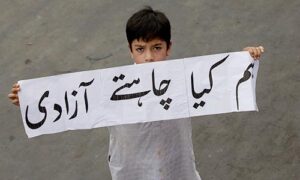
India’s perpetual refusal to conduct a plebiscite in the region triggered an anti-India resistance movement in the late 1980s, when the Kashmiri people felt there was no other option. Despite this, the majority of the Kashmiris are not rabid fanatics — they simply want to live in peace. Their struggle, spanning a period of 73 years, has been largely political in nature. The enormous suffering and deprivation that it has endured as a consequence of being an ‘occupied’ nation is what frames the political outlook of their struggle.
The Kashmiri leaders, who are democrats in attitude and progressive in approach, have never shied away from holding a dialogue with either of the countries holding the key to the solution. But their urging for a peaceful settlement of the dispute has always been misconstrued by India as their weakness. Instead of addressing the issue through the peaceful means of dialogue and diplomacy, successive Indian rulers have always treated Kashmir as a colony. Exploitation of Kashmir’s resources, and killing and maiming of its population through heavy militarisation and brutality, have been the Indian Government’s consistent policy. The reckless violence unleashed upon the Kashmiris by the Indian State over the past 30 years has resulted in widespread death, destruction, and massive violation of civil and human rights of the Kashmiri people.
Several international human rights organisations of repute, such as Amnesty International and Human Rights Watch, among others, have regularly and graphically illustrated the plight of the Kashmiris. More importantly, the Office of the High Commissioner of Human Rights’ landmark report of 2018, which serves as an indictment of India’s dangerous and destructive role in the region, called for an independent investigation into rights’ abuses committed by the Indian forces. But ironically, this rapidly growing global concern has not been able to break the continuing vicious cycle of violence in the region.
Despite the growing calls for elimination of all forms of violence, life in Kashmir is getting tougher for the native population, who are battling for survival under India’s prolonged military occupation.
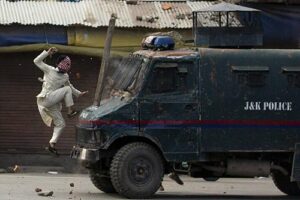
There has been no respite from the violence. Instead, the political and human rights situation took an ugly turn in the aftermath of the BJP government’s 5th August 2019 controversial decision that led to the abrogation of Article 370 of the Indian Constitution, which had guaranteed special status to the state of Jammu and Kashmir.
While social, political and economic life remained critically suppressed, the valley of Kashmir reeled under a suffocating military siege and communication blockade for more than 14 months. Thousands of Kashmiris, mostly youth, were arrested under the notorious Public Safety Act and thrown into prison. Hundreds of top-ranking politicians were also arrested and booked under the infamous black laws and left to rot in jails outside the Kashmir valley.
What ails the Kashmir valley today is the ongoing massive and multi-pronged social, political and cultural onslaught against its indigenous population by the Indian Government. The apartheid regime’s ultranationalist policies have pushed the region deeper into a quagmire of uncertainty, chaos and lawlessness. The Kashmiris’ fundamental freedoms, including the right to freedom of speech and expression, the right to peaceful assembly, and the right to peaceful protest remain strictly prohibited.
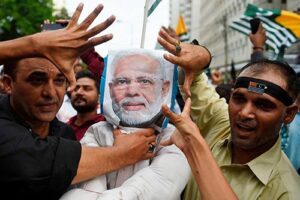
Illegal imprisonment of political activists under sedition laws, and a witch-hunt against civil society, rights activists and journalists, the systematic killing of Kashmiri youth, and the everyday mayhem and carnage on the streets has now become so commonplace that it ceases to shock the leaders of foreign countries. Kashmir is swept under the carpet in bilateral discussions between world leaders. When billions of dollars in deals and geopolitical alliances are at stake in their negotiations, why would they want to jeopardise their own interests? So the Kashmiris are left to their fate.
The level of indifference and apathy with which the international community treats the dispute is one of the major reasons behind the continuing bloodshed in the Kashmir valley.
The inaction on the part of the global community has emboldened and encouraged the government of India to continue and further escalate its brutal policies of oppression and suppression to silence the Kashmiris. Unfortunately, the Muslim world too is completely silent and except for issuing empty statements no practical measures have been taken to alleviate the unending sufferings of the Kashmiris. Western and European countries, by and large, see the Kashmir problem through the prism of India. Owing to their respective economic interests, no country is ready to take a categorical stand on the issue of Kashmir, and the United States, which has now embraced India as its strategic partner, is turning a blind eye to the downward spiral of cruelty and chaos in Kashmir, remaining just a silent spectator. This is unconscionable.
So long as realpolitik continues to steer the dynamics of the Kashmir dispute at the international level, the ruthless suppression, which has been a prominent feature of India’s Kashmir policy, is likely to persist in the future.
Under the persisting regional and international scenario, there is not much hope of any positive change taking place in the region. Violence seems to be increasing in the valley as the BJP government has started to implement its Plan B, which is all about changing the region’s demography, culture, language and history, constructing more temples, establishing more pilgrimage-sites for Hindu devotees, and making Kashmir a Hurriyat-free region much before the next elections in 2024.
This is a disastrous recipe that is bound to open the floodgates to more violence and bloodshed in the region.
After banning the Jamat and the Jammu Kashmir Liberation Front (JKLF) under the notorious Unlawful Activities Prevention Act (UAPA), the Indian government is considering the imposition of a complete ban on the All-Parties Hurriyat Conference. The majority of the high-profile campaigners for the Kashmiris’ right to self-determination, including politicians, civil society activists and rights defenders, have already been booked under the black laws and incarcerated in jails outside the valley, with little hope of their release. All voices of reason are being silenced one by one.
Fraught with serious political ramifications, this move is tantamount to pushing the Kashmiris to violence. Squeezing space for political dissent will increase the level of anger, anxiety, and sense of alienation among the Kashmiri youth who are already living under suffocating conditions. While the Modi government seems to be in no mood to provide any kind of relief or space for political dissent, the growing alienation of Kashmiris might probably compel the youth to choose a violent path in order to vent to their anger. Under the given circumstances, any hope of improving the ground situation in Kashmir remains elusive.
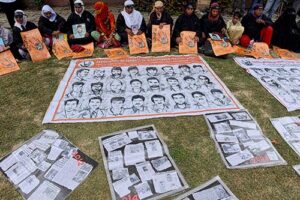
Adding to the sense of alienation and despair, the termination of Muslim government employees is yet another conspiracy to render Kashmiris jobless.
On the other hand, India has started a disinformation and propaganda campaign against Pakistan and Kashmiris, accusing Pakistan’s ISI of sending the Taliban from Afghanistan to fight in Kashmir. The Taliban take-over of Kabul will now become yet another excuse for Indians to kill Kashmiri youth by simply branding them as foreign terrorists.
The Modi government’s recent track record of dealing with Kashmir shows that it will not hesitate in exercising state power as it believes that the use of military muscle is the only way to teach the Kashmiris a lesson. This policy, which bears all the imprints of authoritarian rule, actually revolves around Doval’s dogma of “offensive defence strategy,” which seeks to control, by any means, all of Kashmir, its people, its land, and resources.
Doval believes that the policy of appeasement by New Delhi towards Kashmir and Pakistan has cost the Indian state heavily. He also believes that the state must not shy away from exercising its full might against the Kashmiris, or even Pakistan, when needed. Interestingly, Doval’s strategy synchronises with the hardcore Hindu nationalists’ ideology, who consider Kashmiri Muslims and Pakistan a threat to India’s sovereignty.
The rising tide of xenophobia and Hindu nationalism within the Indian society is yet another dangerous aspect that has had a devastating impact on the lives of Kashmiris. The BJP regime, which rose to prominence on the back of communal politics, has been capitalising on this growing anti-Muslim sentiment in the country, using it as a strategic weapon to not only push its ultra-nationalist agenda in Kashmir but to also delegitimise the Kashmiri struggle for freedom by equating it with the rhetoric of “cross-border” terrorism.
This is what the BJP has done during the previous elections and a similar sort of strategy, intended to further marginalise the Muslim majority community in Kashmir, is being applied to appease right-wing parties which played a vital role in BJP’s ascendance to power.
Secondly, the rise of Hindu nationalism has profound political ramifications for India’s relationship with Pakistan. It is already evident that the right-wing parties take a more hardline approach when it comes to security, especially as it relates to Kashmir and Pakistan.
Out of seven, five Indian states including Uttar Pradesh (UP), the heartland of Indian politics, are set to go for elections in the first quarter of 2022. The UP is considered the most important one as it will set the tone for the general elections scheduled to be held in 2024. Knowing that the route to New Delhi goes through the assembly polls in 2022, there is every likelihood that the BJP, which has nothing to sell to the public, would return to its all-time favourite Pakistan-bashing campaign and may even resort to desperate and risky options, including false flag operations, in Kashmir to woo the Hindu voters. Given the BJP’s history of using Kashmir to stoke nationalist sentiment in the Indian mainland, there is a fear that the Modi regime may attempt to repeat the Pulwama-type attacks in Kashmir to extract political benefits in the upcoming polls. 2022 looks certain to be another grim year for the people of Kashmir.
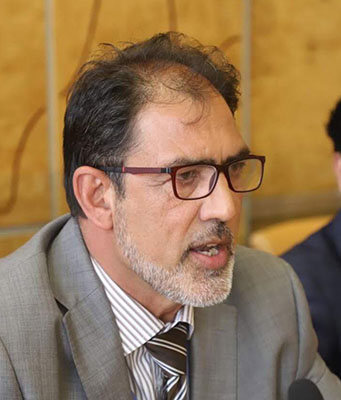
The writer is Chairman, Kashmir Institute of International Relations (KIIR), Islamabad. He is a member of the All Parties Hurriyat Conference, AJK chapter.



